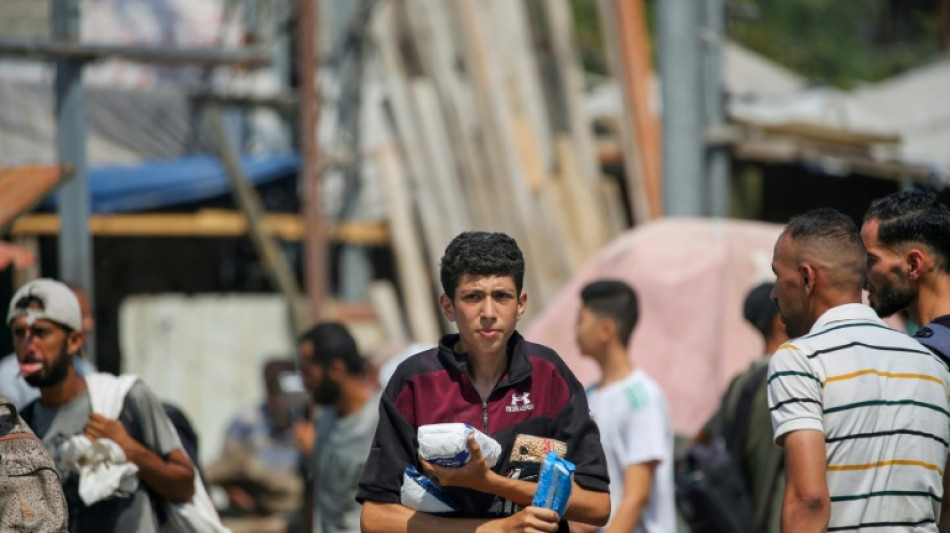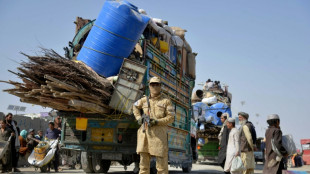

Britain leads calls for airdrops as Gaza hunger crisis deepens
International pressure was mounting on Saturday for alternative ways to be found to deliver food to hungry Palestinian civilians in Gaza, with Britain vowing to back airdrops.
The UK decision to support the plans of regional partners Jordan and the United Arab Emirates came as pro-Palestinian activists piloted a symbolic aid vessel towards the shores of Gaza in defiance of an Israeli naval blockade.
On the ground, the territory's civil defence agency said at least 40 more Palestinians had been killed in Israeli military strikes and shootings.
Humanitarian chiefs are deeply sceptical that airdrops can deliver enough food to tackle the deepening hunger crisis facing Gaza's more than two million inhabitants and are instead demanding that Israel allow more overland convoys.
But British Prime Minister Keir Starmer backed the idea, vowing to work with Jordan to restart airdrops -- and with France and Germany to develop a plan for a lasting ceasefire.
An Israeli official told AFP on Friday that airdrops in Gaza would resume soon, adding they would be conducted by the United Arab Emirates and Jordan.
Starmer's office said that in a call with his French and German counterparts, the "prime minister set out how the UK will also be taking forward plans to work with partners such as Jordan to airdrop aid and evacuate children requiring medical assistance".
The United Arab Emirates said it would resume airdrops "immediately".
"The humanitarian situation in Gaza has reached a critical and unprecedented level," Foreign Minister Sheikh Abdullah bin Zayed Al Nahyan said in a post on X. "Air drops are resuming once more, immediately."
- 'Starving civilians' -
A number of Western and Arab governments carried out air drops in Gaza in 2024, at a time when aid deliveries by land also faced Israeli restrictions, but many in the humanitarian community consider them ineffective.
"Airdrops will not reverse the deepening starvation. They are expensive, inefficient and can even kill starving civilians," said Philippe Lazzarini, head of the UN agency for Palestinian refugees.
Israel imposed a total blockade on the entry of aid into Gaza on March 2 after talks to extend a ceasefire in the now 21-month-old conflict broke down. In late May, it began to allow a trickle of aid to enter.
Israel's military insists it does not limit the number of trucks going into the Gaza Strip, and alleges that UN agencies and relief groups are not collecting the aid once it is inside the territory.
But humanitarian organisations accuse the Israeli army of imposing excessive restrictions, while tightly controlling road access within Gaza.
A separate aid operation is under way through the Israeli- and US-backed Gaza Humanitarian Foundation, but has faced fierce international criticism after Israeli fire killed hundreds of Palestinians near distribution points.
- Naval blockade -
On Saturday, pro-Palestinian activist group Freedom Flotilla said its latest aid boat, the Handala, was approaching Gaza and had already got closer than its previous vessel, the Madleen, which was intercepted and boarded by Israeli forces last month.
The Israeli military said it was monitoring the situation and was prepared to enforce what it called its "legal maritime security blockade".
Gaza's civil defence agency said Israeli fire killed 40 people on Saturday, including 14 killed in separate incidents near aid distribution centres.
One of the 14 was killed "after Israeli forces opened fire on people waiting for humanitarian aid" northwest of Gaza City, the agency said.
Witnesses told AFP that several thousand people had gathered in the area.
Abu Samir Hamoudeh, 42, said the Israeli military opened fire while people were waiting to approach a distribution point near an Israeli military post in the Zikim area, northwest of Sudaniyah.
The Israeli military told AFP that its troops fired "warning shots to distance the crowd" after identifying an "immediate threat".
It added that it was not aware of any casualties as a result of the fire.
Media restrictions in Gaza and difficulties in accessing many areas mean AFP is unable to independently verify tolls and details provided by the civil defence agency and other parties.
Israel launched its military campaign in Gaza after Hamas's October 2023 attack resulted in the deaths of 1,219 people, most of them civilians, according to an AFP tally based on official figures.
The Israeli campaign has killed 59,733 Palestinians, mostly civilians, according to the health ministry in the Hamas-run territory.
burs-dc/glp/kir
W.Albrecht--FFMTZ




